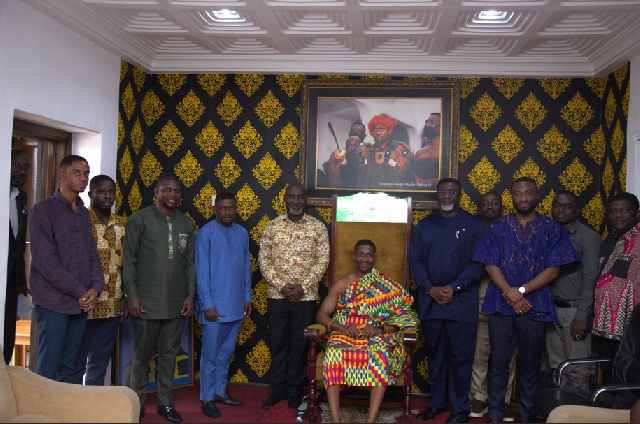Okuapehene’s 3000-acre land to empower Andy Okra’s TCDA to grow tree crops in Akuapem
 Oseadeeyo Kwasi Akuffo Ababio III welcoming the team to his palace
Oseadeeyo Kwasi Akuffo Ababio III welcoming the team to his palace
Ghana’s fight for food security is no longer an abstract policy talking point; it’s a reality felt every day in markets, kitchens, and on the national balance sheet.
The country spends hundreds of millions of dollars each year importing food products it could grow and process itself.
In 2023 alone, Ghana imported nearly $133 million worth of palm oil and its fractions, much of it shipped in from Malaysia, Indonesia, and Côte d’Ivoire.
Even with local palm oil production approaching 300,000 metric tons, a shortfall of about 35,000 tons left the country dependent on foreign supplies to fill the gap.
The picture isn’t much different for other crops: Ghana’s mango industry, while celebrated for its sweet, export‑grade fruit, still exports less than half of its production, and its coconut potential, sprawling along the southern belt, remains largely untapped.
This dependence creates a vicious cycle.
Each container of imported palm oil or mango concentrate chips away at foreign reserves.
Each gap in processing capacity leaves farmers with unmarketed harvests, forced to sell cheaply or watch produce rot.
And yet, the irony is stark: Ghana has the land, the climate, and the history to change this narrative.
More than half of the country’s land is suitable for agriculture, with fertile belts perfectly suited for tree crops like oil palm, mango, and coconut.
What it has lacked is the kind of large, unencumbered parcels of land that can support scaled‑up production and processing, land that allows policy to turn into practice.
That is why the decision by Okuapehene Oseadeeyo Kwasi Akuffo Ababio III, Paramount Chief of the Akuapem Traditional Area, to donate 3,000 acres under the OKWAF Foundation to the Government of Ghana through the Tree Crops Development Authority (TCDA) is more than a ceremonial gesture.
It is an intervention at the heart of Ghana’s agricultural struggle.
It connects the dots between import dependency and domestic potential, between fragmented smallholder plots and the need for consolidated, modern farming blocks.
Akuapem, after all, has been an agricultural heartbeat for generations. Its hills and valleys have long nurtured oil palm, mango, and coconut crops woven into daily life and tradition.
Oil palm, in particular, was once “as common as the morning mist,” the Okuapehene recalled, shading homesteads, fueling kitchens with palm oil, and feeding markets with kernels used for soap‑making.
Mango trees dropped golden fruit into waiting baskets, and coconuts lined the slightly lower zones, their water and flesh a steady source of nourishment and trade.
But for decades, this abundance has been undercut by underinvestment and fragmentation. Smallholders worked in isolation. Processing plants were few. Export pipelines sputtered.
The region’s crops, rich as they were, never scaled into the industries they could become.
The 3,000 acres donated through the OKWAF Foundation changes that equation.
For the first time, TCDA has a secure, contiguous stretch of land to demonstrate what coordinated agriculture can achieve: oil palm estates that close the import gap, mango orchards that finally meet export potential, coconut groves that fuel both local consumption and a pipeline of coconut oil for global markets.
Akuapem has long been a beacon of agricultural richness in Ghana. Nestled in the Eastern Region’s lush hills, its fertile soils and moderate climate have made it one of the country’s most naturally endowed farming zones.
For centuries, the land has quietly sustained mango groves, coconut stands, and oil palm clusters, weaving these crops into the fabric of daily life and culture.
During the meeting announcing the donation, Oseadeeyo Kwasi Akuffo Ababio III shared a vivid historical account of oil palm in Akuapem, recalling how it has been more than just a crop; it has been a way of life. He noted that oil palm was once “as common as the morning mist,” growing along homesteads, lining footpaths, and shading village boundaries.
Families relied on it for palm oil for cooking, palm kernels for soap-making, and even palm fronds for traditional ceremonies.
Nana recounted that every compound had at least one oil palm tree, describing how the crop fueled local markets and trade generations before modern agribusiness came into the picture.
Beyond its economic role, oil palm held cultural weight; its byproducts featured in festivals, rites of passage, and communal gatherings.
But while oil palm remains a signature crop, Nana highlighted that Akuapem’s hills are equally blessed for mango and coconut farming.
The region’s rich volcanic soils and cool breezes nurture mango trees that bear sweet, export-grade fruit. Meanwhile, coconut thrives in the slightly lower, warmer zones, providing farmers with steady yields for food, drink, and industry.
These three crops, oil palm, mango, and coconut, are not new introductions to Akuapem; they are part of its DNA.
Yet, as Nana pointed out, decades of underinvestment and fragmented smallholder efforts have kept their potential capped.
Large-scale cultivation, processing, and export have been sporadic, with the area lacking the infrastructure to match its natural abundance.
For the Government of Ghana, the Okuapehene’s donation is nothing short of a breakthrough. Access to large, unencumbered land parcels has long been one of the biggest bottlenecks in rolling out large-scale agricultural programs. With this 3,000-acre stretch now secured, the Tree Crop Development Authority (TCDA) has the platform to build a flagship demonstration hub for its tree crop agenda.
Source: Classfmonline.com/Cecil Mensah
Trending Business

ADB hosts National Farmers’ forum to honour 2025 award winners
06:17
JS Dumelo: Deputy Agric Minister urges politicians and state institutions to embrace, model commercial farming
17:31
GIPC explores investment partnerships with Greece in manufacturing and renewable energy
15:07
Ghana unveils US$3.4 billion plan to become continental leader in renewable energy
12:54
Interior Ministry gives bullion-van operators 45 days to meet new national safety standards
12:52
Parliament approves Health Ministry’s GH¢S 2.8bn budget, highest allocation so far
12:45
GIPC courts German investors with new economic incentives and industrial growth agenda
11:56
Inflation declines to 6.3% for Nov, 11 months in a row
12:57
Transport Ministry: Airport passenger service charge increased to GHS100
07:13
ASSMA's one-week ultimatum threat to mining sector peace, stability - Ghana Chamber of Mines
22:23



